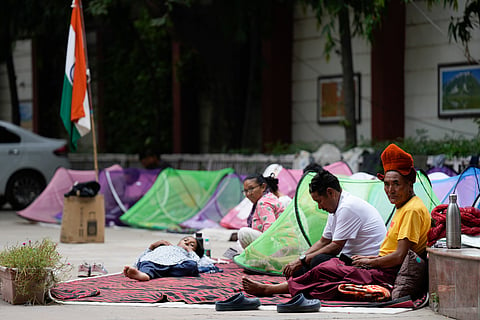Drinking Laung ka paani and some juice: that is how climate activist Sonam Wangchuk and other protestors ended their 16-day fast on October 21 after the Union Ministry of Home Affairs (MHA) agreed to resume discussions with Ladakh’s civil society leaders.
Sonam Wangchuk Breaks Fast After MHA Agrees to Meet Ladakh Leaders On December 3
After a 16-day-long fast, Sonam Wangchuk has said he hopes MHA will hold talks with Ladakh’s civil society leaders “in good faith”
Addressing the press on Monday evening, Wangchuk said, “We are happy to say that our main appeal has been solved. The Joint Secretary of the Home Ministry handed a letter to me stating that talks between apex bodies of Leh and Kargil with the Central Government will resume in December. We are hoping these talks will be held in good faith and with the utmost cordiality.”
The Ministry scheduled a meeting of the High-Powered Committee (HPC) on December 3, chaired by Nityanand Rai, the Minister of State for Home Affairs.
Jigmat Panjor, the overall movement coordinator, said Wangchuk and others felt that the MHA agreeing to resume talks meant they “could manage to get something out of our current movement. The four-point demand we had before we started the Pad Yatra was that we wanted to resume the talks between our leaders and the MHA. So that was one of our key demands, so we are successful in that so we are happy.”
Panjor, however, pointed out that the meetings in question are a “set process which the MHA used to do with leaders of Ladakh” so “the delay in giving the dates or resumption of the dialogue was a bit unfortunate.”

Wangchuk and his followers had gone on a hunger strike after they were arrested on October 1 while on their Pad Yatra and entering New Delhi. The Yatra, spearheaded by the Leh Apex Body (LAB) and the Kargil Democratic Alliance (KDA), is part of a larger demand for statehood for Ladakh, the region’s inclusion in the Sixth Schedule of the Constitution to provide tribal status, employment opportunities for locals, and representation for the Union Territory (UT) in the Parliamentary houses.
The hunger strike began on October 6 at Delhi’s Ladakh Bhavan, after the Pad Yatris were denied permission to protest at Jantar Mantar. The environmentalist and 20 volunteers have since been ingesting nothing but salted water.
Over the last two weeks, the national farmers’ body and student bodies have shown up at Ladakh Bhavan to show solidarity with Wangchuk and his followers. Panjor said, that “seeing the youth and the farmers behind the movement feels like people are really concerned about Ladakh and Himalayas as a whole, and they feel connected to the nature. People have successfully conveyed their support for us and the future generations to come. That was really a heartwarming and positive sign for the upcoming days.”
Four-Point Agenda
The Leh Apex Body and Kargil Democratic Alliance have said that the upcoming talks should focus on their four-point agenda.
The four points are: Ladakh’s demand for statehood, tribal status under the Sixth Schedule, employment protection for locals, and increased political representation, with the addition of one Rajya Sabha and one Lok Sabha seat for the region.
The Long Road Ahead
The resumption of talks between the Central Government and Ladakh’s civil society is seen as a critical juncture in addressing the demands of the region. The HPC, initially constituted on January 2, 2023, and reconstituted in the same year in November, is tasked with discussing measures to protect Ladakh’s unique culture and language, ensuring employment opportunities, and empowering the Ladakh Autonomous Hill District Councils of Leh and Kargil.
Although Wangchuk and his fellow activists have expressed hope that the upcoming talks will bring positive results, they remain cautiously optimistic. “My main role was to facilitate these talks. I hope I do not have to sit on a hunger strike again,” Wangchuk said.
